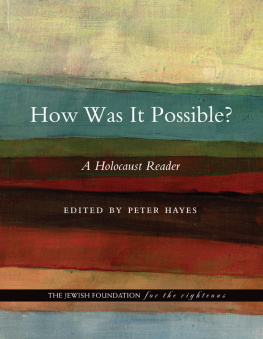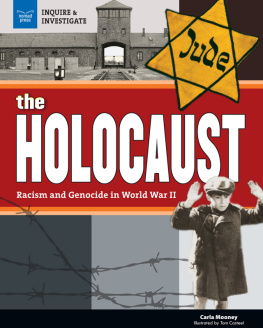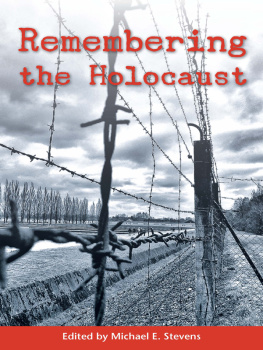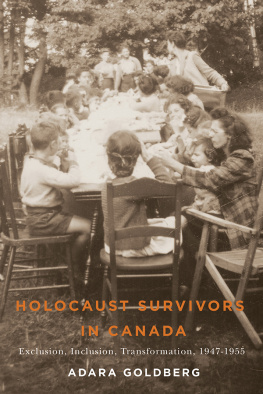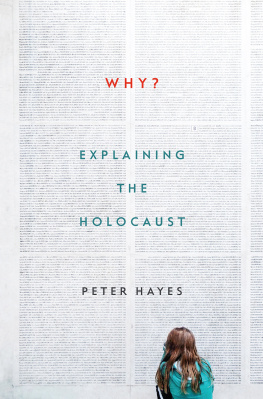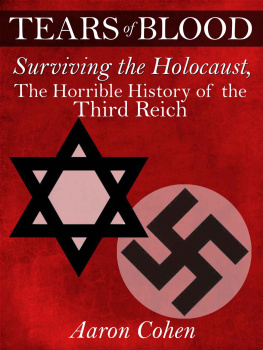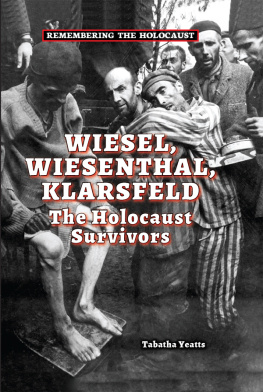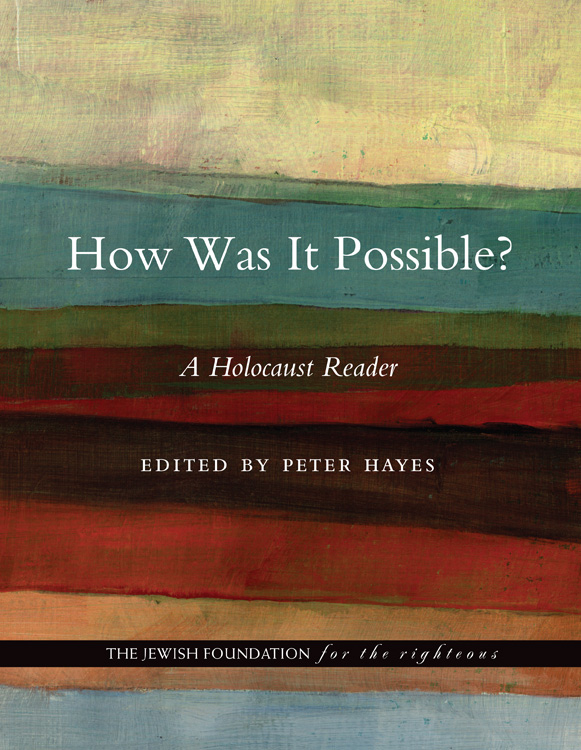2015 by the Jewish Foundation for the Righteous.
Acknowledgments for the use of copyrighted material appear in , which constitute an extension of the copyright page. All rights reserved.
How was it possible?: a Holocaust reader / edited by Peter Hayes; foreword by Harvey Schulweis.
Includes bibliographic references and index.
ISBN 978-0-8032-7469-3 (pbk.: alk. paper)
1. Holocaust, Jewish (19391945) 2. Holocaust, Jewish (193945)Causes. 3. AntisemitismGermanyHistory20th century. 4. JewsGermanyHistorytwentieth century. 5. JewsPersecutionsGermany. 6. GermanyHistory193345. 7. GermanyEthnic relations. I. Hayes, Peter, September 7, 1946, editor.
D 804.3. H 699 2015 940.53'18dc23
The publisher does not have any control over and does not assume any responsibility for author or third-party websites or their content.
Contents
Harvey Schulweis
Peter Hayes
Peter Hayes
Robert S. Wistrich, from Antisemitism: The Longest Hatred
Michael Burleigh and Wolfgang Wippermann, from The Racial State
Amos Elon, from The Pity of It All
Klaus P. Fischer, from Nazi Germany: A New History
Ezra Mendelsohn, from The Jews of East Central Europe Between the World Wars
Peter Hayes
Eckart Conze et al., from Das Amt und die Vergangenheit [The Office and the Past]
Sebastian Haffner, from Defying Hitler
Thomas Khne, from Belonging and Genocide
Avraham Barkai, from From Boycott to Annihilation
Ernst von Weizsckers Remarks to a Swiss Diplomat, November 15, 1938, from Documents Diplomatiques Suisses
Jews, What Now? from Das Schwarze Korps, November 24, 1938
Hitlers Reichstag Speech, January 30, 1939, from Nazism 19391945
Peter Hayes
Richard Breitman and Alan M. Kraut, from American Refugee Policy and European Jewry, 19331945
Eugen Weber, from The Hollow Years
Louise London, from Whitehall and the Jews, 19331948
Independent Commission of Experts SwitzerlandSecond World War, from Switzerland, National Socialism, and the Second World War
Rebecca Boehling and Uta Larkey, from Life and Loss in the Shadow of the Holocaust
Marion Kaplan, from Between Dignity and Despair
Peter Hayes
Robert N. Proctor, from Racial Hygiene
Gtz Aly and Suzanne Heim, from Architects of Annihilation
Timothy Snyder, from Bloodlands
Gtz Aly, from Hitlers Beneficiaries
Ulrich Herbert, from Hitlers Foreign Workers
Peter Hayes
Isaiah Trunk, from Judenrat
Chaim Kaplan, from Scroll of Agony
Gordon J. Horwitz, from Ghettostadt:dand the Making of a Nazi City
Samuel D. Kassow, from Who Will Write Our History?
Yisrael Gutman, from The Jews of Warsaw, 19391943
Felicja Karay, from Women in the Holocaust
Martin Dean, from Robbing the Jews
Peter Hayes
Mark Roseman, from The Wannsee Conference and the Final Solution
Richard Rhodes, from Masters of Death
Raul Hilberg, from The Destruction of the European Jews
Edward B. Westermann, from Hitlers Police Battalions
Yehuda Bauer, from Anatomy of the Auschwitz Death Camp
Primo Levi, from If This Is a Man (Survival in Auschwitz)
Daniel Blatman, from The Death Marches
Peter Hayes
Jan Grabowski, from Hunt for the Jews
Jean Ancel, from The History of the Holocaust in Romania
Saul Friedlnder, from The Years of Extermination: Nazi Germany and the Jews, 19391945
Susan Zuccotti, from The Italians and the Holocaust
Randolph L. Braham, from Studies on the Holocaust
Michael Phayer, from The Catholic Church and the Holocaust, 19301965
Independent Commission of Experts SwitzerlandSecond World War, from Switzerland, National Socialism, and the Second World War
Peter Hayes
Jonathan Goldstein, from Lessons and Legacies VI
Michael Good, from The Search for Major Plagge
Patrick Henry, from We Only Know Men
Gunnar S. Paulsson, from Secret City
Bob Moore, from Survivors
Richard Breitman and Alan M. Kraut, from American Refugee Policy and European Jewry, 19331945
Paul A. Levine, from From Indifference to Activism
Peter Hayes
Mark Wyman, from DP s: Europes Displaced Persons, 194551
Tom Segev, from The Seventh Million
Beth B. Cohen, from Case Closed
Tony Judt, from Postwar
Richard J. Evans, from Lying about Hitler
Michael R. Marrus, from Some Measure of Justice
Eva Hoffman, from After Such Knowledge
Photographs
Maps
Tables
Harvey Schulweis
During the Holocaust thousands of non-Jews refused to be passive in the face of the evil they witnessed, rescuing Jews, often at risk to their own lives and the lives of their families. The Jewish Foundation for the Righteous ( JFR ) provides monthly financial support to such aged and needy non-Jews and educates future generations about their extraordinary acts of courage.
In 1986 Rabbi Harold M. Schulweis created the Foundation to fulfill the traditional Jewish commitment to hakarat hatov, the searching out and recognition of goodness. To this end, the JFR is committed to assisting those Righteous Gentiles who are in need. We must thank and support these extraordinary individuals who were the lone lights in the darkness. These unassuming and dignified people acted without expecting reward, then or now. Yet they express deep gratitude for the Foundations support.
Rescuers serve as role models for us and for future generations. They teach us that, even in the midst of the worst evil in recorded history, each human being had the capacity to act humanely. Without their example, we are left only with the lessons of atrocity, hatred, and indifference to teach our children.
The JFR s national Holocaust teacher education program seeks to teach teachers the history of the Holocaust and, in this context, the significance of the Righteous as moral and ethical exemplars. As the Holocaust recedes in history, generations to come will never meet a Holocaust survivor or a Righteous Gentile, yet they must have an understanding of that terrible period. This Holocaust anthology, edited and introduced by Peter Hayes, provides such a resource.

